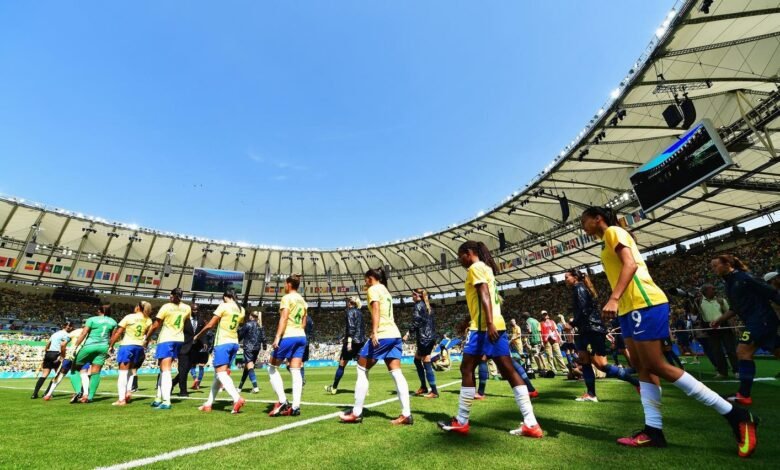Brazilian bid is the highest in the race to host the 2027 Women’s World Cup

RIO DE JANEIRO, BRAZIL – AUGUST 16: Brazil players enter the field during the … [+]
FIFA’s bid assessment report on the two remaining candidates to host the 2027 Women’s World Cup ranked the Brazilian bid as superior to the joint European bid of Belgium, the Netherlands and Germany (BNG).
The bid evaluation report was compiled following extensive inspection visits carried out by FIFA officials to each candidate country earlier this year. It will have no binding impact on the 211 members of the FIFA Congress who will vote to elect the hosts of the 10th FIFA Women’s World Cup at its 74th meeting in Bangkok, Thailand, on May 17.
However, the report will have substantial persuasive value. FIFA ratings are comprised of a technical assessment based on an assessment of key infrastructure and commercial criteria, and a risk assessment that includes, but is not limited to, human rights and sustainability.
Out of a maximum score of five, the Brazilian proposal was evaluated at 4.0, compared to 3.7 from BNG. FIFA identified that a Women’s World Cup has the potential for a strong commercial position, with a combination of competitive revenue potential and clear cost efficiencies” and stated that holding the tournament in Latin America would have “a tremendous impact on women’s football in region.”
The president of Brazil, Luiz Inácio Lula da Silva, receives Ednaldo Rodrigues, president of … [+]
Although the report admits that BNG’s candidacy “presents a solid and comprehensive proposal. The proposed stadiums have relatively smaller capacities,” which would affect the proposed tournament’s ability to beat attendance records set by the 2023 Women’s World Cup.
In a traffic light system for marking respective bids, the only red flag for any of them was the legal contractual structure of the BNG bid. The report explains that “a number of material changes were made to the hosting documentation, which would result in a more complex legal framework as a starting point for tournament planning, should the bid be successful.”
October 24, 2023, Hesse, Frankfurt/Main: German Chancellor Olaf Scholz (SPD, M) holds a banner with … [+]
It said that “such deficiencies
potentially expose FIFA to significant risks, including increased
cost obligations, significant dilution of its rights (including
the liability of the stadium authorities is limited to the rental of the stadium
rate) and a loss of operational control.”
A South American nation has never hosted a women’s World Cup, but Brazil successfully hosted the 1950 and 2014 men’s World Cup and, more recently, the men’s and women’s Olympic Football Tournaments during the 2016 Games. Built or renovated for the 2014 World Cup, they were used in 2016 and are part of the bid to host the 2027 Women’s World Cup.
Europe last hosted the Women’s World Cup in 2019. Germany – one of three nations that are part of the joint BNG (Belgium, Netherlands, Germany) bid to host the 2027 finals – hosted the tournament in 2011. Before the 2023 World Cup, shared by Australia and New Zealand, the women’s tournament had never before been co-hosted – let alone shared between three nations – bringing with it the complexities of multiple teams automatically qualifying as hosts.
Last Monday, the bid to host the 10th FIFA Women’s World Cup became a two-horse race after the third confirmed candidates, the United States and Mexico, withdrew. The United States had previously hosted the tournament twice in a row, an unprecedented occurrence in nearly a century of men’s and women’s World Cups.
The two countries, along with Canada, will host the 2026 men’s World Cup and hosting the subsequent women’s tournament would also be unprecedented. Whether or not hoping to win another vote at the FIFA Congress was too much to ask, they have decided to shift their focus to hosting the 2031 edition of the Women’s World Cup, where they must face competition from China, Morocco and South Africa, who have also pulled out of the bid to host the 2027 tournament.
England and Spain, the two finalists of last year’s FIFA Women’s World Cup, have also announced their intention to bid to host the 2031 tournament. However, if BNG’s bid to host the 2027 finals goes well If successful, another European country will not be able to host the subsequent tournament, leaving England and Spain out of contention until 2035.
North American neighbors hope their advantage comes from their call for equality. “In a historic first, the bid will require investment equal to that of the men’s tournament, eliminating investment disparities to fully maximize the commercial potential of the women’s tournament”
US Soccer President Cindy Parlow Cone insisted that “moving our bid will allow us to host a record-breaking Women’s World Cup in 2031, which will help grow and raise the level of women’s soccer, both here at home and across the world.” world”. ”




